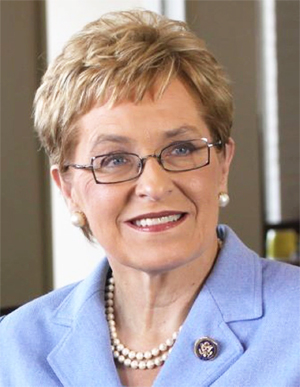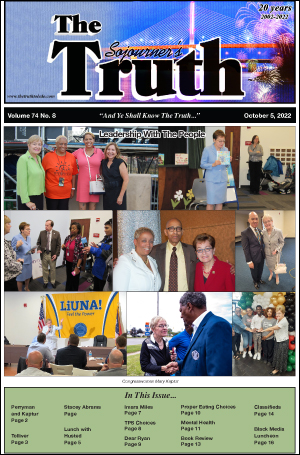
By Rev. Donald L. Perryman, Ph.D.
The Truth Contributor
[Politicians] must edge closer to the public work already being done by lay citizens and community groups. |
– Albert Dzur
Congresswoman Marcy Kaptur, the Dean of the Ohio Delegation, has represented Ohio’s 9th Congressional District since 1983 and is the longest-serving woman in the history of the U.S. House of Representatives.
Representative Kaptur is also the second-longest serving current Member on the House Appropriations Committee. The prominent lawmaker currently chairs the prestigious House Appropriations Subcommittee on Energy and Water Development. In addition, she serves on the powerful Defense Subcommittee and the House Appropriations Subcommittee on Commerce, Justice, and Science.
However, Kaptur’s sustainable legislative and electoral success lies in her ability to recognize the value of constituents’ attempts to solve problems in the community. By linking community-initiated efforts with government resources, Kaptur helps citizens to produce change.
I spoke with Ms. Kaptur about her governing philosophy and outstanding service to the community as she competes in a tight race for reelection. Here is our conversation:

Perryman: What has led to your distinguished career?
Kaptur: Toledo’s always been my home and where I grew up. I was the first person in our family to graduate from high school and college, and I came home to improve my community in the late 1960s. I was a city and regional planner by training. I thought that, in conjunction with the Civil Rights Movement, I could dedicate my life to rebuilding our country and cities.
I didn’t run for office until I was 36 years old. Before that, I had worked in Toledo and Lucas County for a decade. Then I went to work for a national group that sent me around to cities like Newark and Chicago to work in multi-racial neighborhoods.
Perryman: What specific event or person got you involved in politics?
Kaptur: A book was written about my work. The Carter administration then selected me to become one of three advisors to the president on urban policy for the country. So, I served him throughout his presidency, and when he lost reelection, I went back to college so I could teach in my field.
I came home at Thanksgiving while working on my doctorate at MIT and met a friend who had been in my grade school. She was working behind the meat counter for one of the supermarkets and burst into tears when I saw her. I said, “what’s wrong?” She said, ‘Marcy, life is so hard. My husband lost his job. I’ve got our two grandchildren that I’m trying to take care of.’ That was 1982 when Toledo’s unemployment was upwards of 19 percent, and our automotive industry was flat on its knees. This followed the first Arab oil embargo back in the 1970s. That conversation impacted me because I remember her as a very gleeful, happy young woman. Now she was really up against it.
I had always been active in politics, but never as an elected official. After that, a couple of my friends said, ‘why don’t you run for Congress against the incumbent?’ That’s how it began.
I eventually got on the appropriations committee and actually beat Nancy Pelosi to get on it, and she never forgot it. I now have a very important gavel of my own, energy and water, and I do many other things in Congress.
So, we’ve been about the task of rebuilding, and you can see the results of a lot of effort.
Perryman: What are some successful examples of your work in Congress?
Kaptur: General Motors announced a $760 million to invest in Toledo in the very first G.M. plant in the world that will be involved in the new electronic vehicle propulsion system.
I also voted for the rescue and refinancing of General Motors about 10 years ago during the Obama era. We almost lost the vote to rescue the U.S. auto industry then. So, I’ve been a part of that and the steel industry’s rebirth with companies like Cleveland-Cliffs a billion dollars on each side of the Maumee River.
I’m a member of the steel caucus and on the defense committee. We are very much a part of the revival of the automotive and steel industries in our region, and I’ve always been trying to bring opportunity and progress to our area.
So, we’re also talking about the downtown farmer’s market and our senior farmer’s market coupon program, which benefits so many seniors and women who are pregnant or lactating to be able to get fresh fruits and vegetables.
And, we’re talking about working with the Toledo Urban Federal Credit Union, having them become such a shining beacon across our region. It’s the first time we’ve actually had fair credit in the heart of Toledo, especially in the African-American community. So, I’m very proud of that achievement in our community and many other projects I’ve been a part of.
Perryman: Are there any examples of infrastructure projects you want to mention?
Kaptur: Yes, the Veteran’s Glass City Skyway, which took us almost 16 years to pass, to fund and ultimately construct, the saving of the Amtrak station in Toledo, the busiest Amtrak station in Ohio, getting us ready for modern rail, and the new infrastructure bill gives us a chance to do that.
There are just so many. U.S. 24 from the Buckeye Basin all the way to the Indiana line. That was my project. Also, saving the medical school at the University of Toledo and its hospital, I never thought I’d have to get involved with that.
Perryman: Some have said that democracy is on the line in the current election. Does democracy merely mean wearing a flag pin on the lapel? Does it mean electoral majoritarianism and deliberative proceduralism while simultaneously taking away reproductive choice and other long-held rights?
Kaptur: What a good question. For me, it means every person is a blessed creation. Every person matters. Their vote matters, their opinion matters, and the rule of law in the United States matters.
I was one of the people caught up in this insurrection here in Washington and saw these people come in from around the country and do horrible things. Over 144 of our police officers were wounded. That was an insurrection. That was civil disorder that harmed people and injured people. Democracy doesn’t mean that you do what you want. It means that you operate within a system with fair laws and a judicial system that can adjudicate fairly to every person, including a necessary trial by jury, guaranteed in our constitution.
Perryman: Schools taught us that our government is “of the people, by the people, and for the people.” I’m not sure it’s “of the people” anymore because of gerrymandering. Neither does it appear to be “by or for the people” since we have many “representatives” who chose the voters instead of the voters choosing them.
Yet, one bright spot in government is how you’ve come in and partnered with groups like the Toledo Urban Federal Credit Union. You are doing things with them and collaborating on projects that the citizens can’t complete without the federal government’s assistance. You have been steadfast in bringing in the resources and adding to these community-generated issues already being done in the community.
Kaptur: I help empower people. Part of my job is to empower people and let them know about resources there. I am so proud of the Toledo Federal Urban Credit Union. As I said earlier, it is the first time in the history of Toledo that we have fair credit in the heart of the African American community.
I partly know that again, not just because of the Civil Rights Movement, but I’m also reflecting on the Model Cities program and some of the work we did with Jean Overton and others years ago to help neighborhoods rebuild. From my life and experience, I saw the exodus of fair credit from neighborhoods and the redlining.
So, the Toledo Urban Federal Credit Union is a tremendous achievement. It was the people there who implemented it, which it must be. Now residents can see their economic power. Now they can experience bringing their resources to a place that will not exploit them. The community can help small businesses grow, help people get windows for their houses at a fair rate, and buy cars. That is to realize the financial power of the African-American community.
Perryman: Many of our institutions have recently lost legitimacy. How would you restore the people’s confidence in our institutions?
Kaptur: What I try to do, for instance, Bishop Duane Tisdale came to me once and was interested in building housing. I didn’t build the housing for him. Still, I let him know of available federal programs. His organization and special entities that he set up were able to prepare an application. Now there are dozens and dozens of people who have a place to live as they age.
If people bring ideas to me, I try to help them figure out how to fix or improve their situation. Take the downtown Toledo Farmer’s Market. When I was first elected, it was a neglected place in a part of town that people ignored. You go down there today, and there are over 100 vendors. They don’t have enough room. I was trying to help local people be able to sell. You can meet somebody down there who runs a company called Gertie’s Dressing. We set up an organization to help them move their product to market.
For the African-American community, I feel that there are so many businesses yet to be born to help people move their ideas to market. We have examples of where people have been successful and can be models for others. We Be Ribs is an example of those that have come to see me and have then taken things into their own hands and are being very successful in our community. They are a model for others around the country.
Perryman: I really like that because you’re talking about a complimentary partnership that sees each other as peers and not a dominant–subdominant power relationship.
Kaptur: Well, you bring up a symbiosis. It’s like a joining together. So, for example, when we built the Veterans Commons down on Detroit Avenue for homeless vets, there was no sponsor locally.
I brought National Church Residences to Toledo, working with Billie Johnson from the Area Office on Aging. She said, “Hey, you know what, Marcy, we think we can help on this.” And wouldn’t you know, we built with the help of National Church Residences, federal money, and the sponsorship of the Area Office on Aging, the Veterans Commons on Detroit Avenue. So again, a symbiosis, a working together, trying to figure out once someone has a vision and it’s worthy, how we accomplish it.
Perryman: Finally, please summarize your campaign message.
Kaptur: Well, I like to say, ‘What America makes and grows, makes and grows America!’
I’m very much for strengthening local enterprise that will grow. Whether that enterprise is manufacturing like General Motors or whether it is a company like Mondelez Foods, the largest flour mill in the world on Toledo’s east side. Our country grows and strengthens when we make and grow things in America. So I believe very much in focusing locally to succeed nationally.
If every congressional district in the country worked as hard as we do to maximize the opportunities for people and the enterprises for people, the country would grow as a result.
Contact Rev. Donald Perryman, PhD at drdlperryman@centerofhopebaptist.org

